I posted another question with a similar regards a few days ago:
I managed to get at least a "working" solution now, meaning that the process itself seems to work correctly. But, as I am a bloody beginner concerning Spark, I seem to have missed some things on how to build these kind of applications in a correct way (performance-/computational-wise)...
What I want to do:
Load history data from ElasticSearch upon application startup
Start listening to a Kafka topic on startup (with sales events, passed as JSON strings) with Spark Streaming
- For each incoming RDD, do an aggregation per user
- Union the results from 3. with the history
- Aggregate the new values, such as total revenue, per user
- Use the results from 5. as new "history" for the next iteration
My code is the following:
import kafka.serializer.StringDecoder
import org.apache.spark.streaming._
import org.apache.spark.streaming.kafka._
import org.apache.spark.{SparkContext, SparkConf}
import org.apache.spark.sql.{DataFrame, SaveMode, SQLContext}
import org.elasticsearch.spark.sql._
import org.apache.log4j.Logger
import org.apache.log4j.Level
object ReadFromKafkaAndES {
def main(args: Array[String]) {
Logger.getLogger("org").setLevel(Level.WARN)
Logger.getLogger("akka").setLevel(Level.WARN)
Logger.getLogger("kafka").setLevel(Level.WARN)
val checkpointDirectory = "/tmp/Spark"
val conf = new SparkConf().setAppName("Read Kafka JSONs").setMaster("local[4]")
conf.set("es.nodes", "localhost")
conf.set("es.port", "9200")
val topicsSet = Array("sales").toSet
val sc = new SparkContext(conf)
val ssc = new StreamingContext(sc, Seconds(15))
ssc.checkpoint(checkpointDirectory)
//Create SQLContect
val sqlContext = new SQLContext(sc)
//Get history data from ES
var history = sqlContext.esDF("data/salesaggregation")
//Kafka settings
val kafkaParams = Map[String, String]("metadata.broker.list" -> "localhost:9092")
// Create direct kafka stream with brokers and topics
val messages = KafkaUtils.createDirectStream[String, String, StringDecoder, StringDecoder](
ssc, kafkaParams, topicsSet)
//Iterate
messages.foreachRDD { rdd =>
//If data is present, continue
if (rdd.count() > 0) {
//Register temporary table for the aggregated history
history.registerTempTable("history")
println("--- History -------------------------------")
history.show()
//Parse JSON as DataFrame
val saleEvents = sqlContext.read.json(rdd.values)
//Register temporary table for sales events
saleEvents.registerTempTable("sales")
val sales = sqlContext.sql("select userId, cast(max(saleTimestamp) as Timestamp) as latestSaleTimestamp, sum(totalRevenue) as totalRevenue, sum(totalPoints) as totalPoints from sales group by userId")
println("--- Sales ---------------------------------")
sales.show()
val agg = sqlContext.sql("select a.userId, max(a.latestSaleTimestamp) as latestSaleTimestamp, sum(a.totalRevenue) as totalRevenue, sum(a.totalPoints) as totalPoints from ((select userId, latestSaleTimestamp, totalRevenue, totalPoints from history) union all (select userId, cast(max(saleTimestamp) as Timestamp) as latestSaleTimestamp, sum(totalRevenue) as totalRevenue, sum(totalPoints) as totalPoints from sales group by userId)) a group by userId")
println("--- Aggregation ---------------------------")
agg.show()
//This is our new "history"
history = agg
//Cache results
history.cache()
//Drop temporary table
sqlContext.dropTempTable("history")
}
}
// Start the computation
ssc.start()
ssc.awaitTermination()
}
}
The computations seem to work correctly:
--- History -------------------------------
+--------------------+--------------------+-----------+------------+------+
| latestSaleTimestamp| productList|totalPoints|totalRevenue|userId|
+--------------------+--------------------+-----------+------------+------+
|2015-07-22 10:03:...|Buffer(47, 1484, ...| 91| 12.05| 23|
|2015-07-22 12:50:...|Buffer(256, 384, ...| 41| 7.05| 24|
+--------------------+--------------------+-----------+------------+------+
--- Sales ---------------------------------
+------+--------------------+------------------+-----------+
|userId| latestSaleTimestamp| totalRevenue|totalPoints|
+------+--------------------+------------------+-----------+
| 23|2015-07-29 09:17:...| 255.59| 208|
| 24|2015-07-29 09:17:...|226.08999999999997| 196|
+------+--------------------+------------------+-----------+
--- Aggregation ---------------------------
+------+--------------------+------------------+-----------+
|userId| latestSaleTimestamp| totalRevenue|totalPoints|
+------+--------------------+------------------+-----------+
| 23|2015-07-29 09:17:...| 267.6400001907349| 299|
| 24|2015-07-29 09:17:...|233.14000019073484| 237|
+------+--------------------+------------------+-----------+
but if the applications runs several iterations, I can see that the performance deteriorates:
I also see a high number of skipped tasks, which increases with every iteration:
The first iteration's graphs look like
The second iteration's graphs look like
The more iterations have passed, the longer the graph will get, with lots of skipped steps.
Basically, I think the problem is with storing the iterations' results for the next iteration. Unfortunately, also after trying a lot of different things and reading the docs, I'm not able to come up with a solution for this. Any help is warmly appreciated. Thanks!



